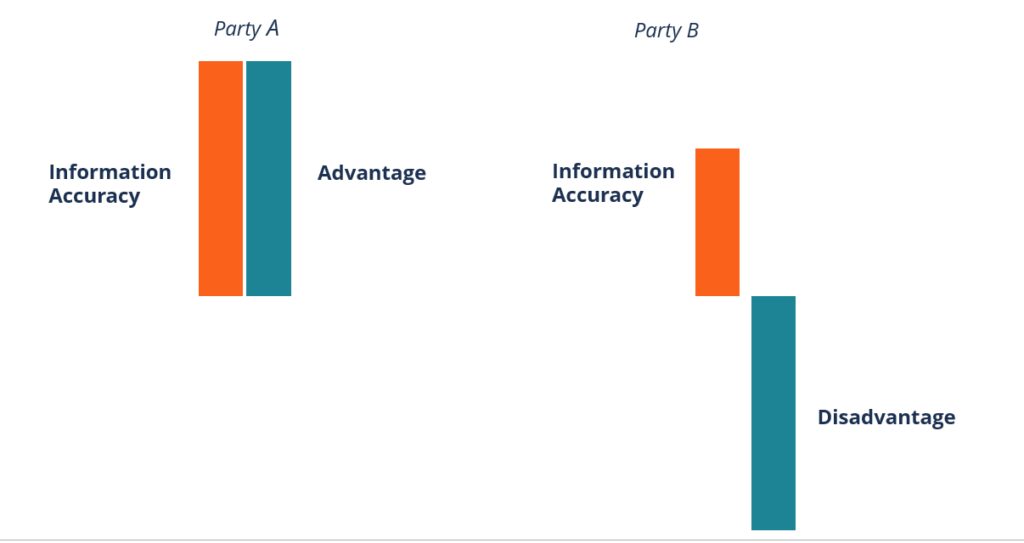Adverse Selection Is a Concept Best Described as
If a hiring practice has no adverse impact it can be considered to be in compliance with hiring procedures. Related Terms Adverse impact disparate impact.
The result is that participants with key information might participate selectively in trades at the expense of other parties who do.

. Adverse selection is a phenomenon wherein the insurer is confronted with the probability of loss due to risk not factored in at the time of sale. Under another definition adverse selection also applies to a concept in the insurance industry. In insurance it describes a situation where as a result of private information the insured are more likely to suffer a loss than the uninsured.
The meaning of ADVERSE SELECTION is a market phenomenon in which one party in a potential transaction has information that the other party lacks so that the transaction is more likely to be favorable to the party having the information and which causes market prices to be adjusted to compensate for the potential unfavorable results for the party lacking the information. One such concept is adverse selection which Baliga describes as hidden information Baliga who teaches at the Kellogg School of Management uses the concept to address everything from the war in Iraq to the strategy of terrorism. But we can begin to understand how adverse selection works by looking at something as simple as buying a used car.
The risk associated with selecting stocks in only a few specific companies. Some of you may be aware of the concept of adverse selection but it is perhaps useful to provide an example of what this actually looks like in practice. B the lenders inability to legally require sufficient collateral to cover a 100 percent loss if the borrower defaults.
Adverse selection refers to the tendency of high-risk individuals obtaining insurance or when one negotiating party has valuable information another lacks. For example it occurs when buyers have better information than sellers as to a particular product say life insurance and so it is the consumers costing the most who generally purchase the product. This occurs in the event of an asymmetrical flow of.
More Nonstandard Auto Insurance. After obtaining insurance a. In economics insurance and risk management adverse selection is a market situation where buyers and sellers have different information so that a participant might participate selectively in trades which benefit them the most at the expense of the other trader.
Adverse selection also called antiselection term used in economicsand insuranceto describe a marketprocess in which buyers or sellers of a product or service are able to use their private knowledge of the riskfactors involved in the transaction to maximize their outcomes at the expense of the other parties to the transaction. In economics insurance and risk management adverse selection is a market situation where buyers and sellers have different information. Commercial Insurance Broker A commercial insurance broker is an individual tasked with acting as an intermediary between.
Adverse selection refers to an event in which one party in a negotiation has relevant information about the situation that the other party lacks and that asymmetry of information leads to a series of bad decisions or choices such as doing more and more business with less profitable or riskier market segments. In todays market the majority of uninformed order flow is internalized by. Adverse selection is an important concept in the fields of economics as well as insurance and risk management.
Adverse selection is a common scenario in the insurance sector. Adverse selection refers to a scenario where either the buyer or the seller has information about an aspect of product quality that the other party does not have. This phenomenon is known as adverse selection Mankiw 2004 and is a bit similar to insider trading which is off course a form of cheating.
That means Bob could have hired as few as 20 45 th of 25 of the female applicants and not had an adverse impact. A high - risk person being more likely to apply for insurance. Refers to market process in which bad results occur due to information asymmetries between buyers and sellers where the bad products or customers are more likely to be selected.
This can apply to situations where the seller knows more than the buyer or if the reverse is true and the buyer withholds relevant information from the seller. The risk that a person will become overconfident in his ability to select stocks. Sometimes known as anti-selection Adverse selection describes circumstances in which either buyers or sellers use information that the other group does not have specifically about risk factors related to a particular business.
In a more abstract definition posed by Belli 2001 adverse selection is described as a form of strategic behavior by the more informed partner in a contract against the interest of the less informed. Adverse impact is generally the first step considered in a potential selection bias case. Definition of Adverse Selection Definition.
Adverse selection is a situation where one party in a transaction has more information about the quality or legitimacy of a product or service than the other party. A textbook example is Akerlofs market for lemons. 19 Adverse selection is a problem associated with equity and debt contracts arising from A the lenders relative lack of information about the borrowers potential returns and risks of his investment activities.
Adverse selection is a concept best described as Risks with higher probability of loss seeking insurance more often than other risks.

Adverse Selection Definition How It Works Practical Example

Adverse Selection Definition 3 Examples And 4 Effects Boycewire
/GettyImages-1211642744-97a9d13f35db4319b8602908e1beb799.jpg)
No comments for "Adverse Selection Is a Concept Best Described as"
Post a Comment